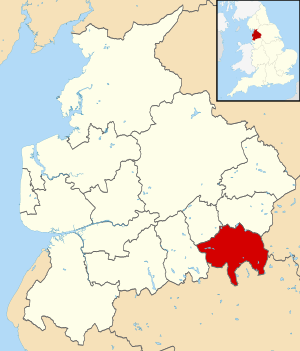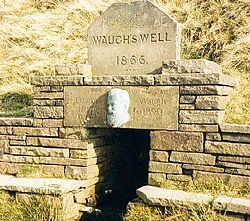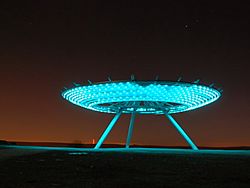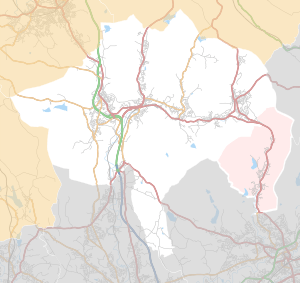Rossendale facts for kids
Quick facts for kids
Borough of Rossendale
|
|
|---|---|
|
Borough and Non-metropolitan district
|
|

Rossendale shown within Lancashire and England
|
|
| Sovereign state | United Kingdom |
| Constituent country | England |
| Region | North West England |
| Ceremonial county | Lancashire |
| Admin. HQ | Bacup |
| Government | |
| • Type | Rossendale Borough Council |
| Area | |
| • Total | 53.3 sq mi (138.0 km2) |
| Area rank | 194th |
| Population
(2005 est.)
|
|
| • Total | 71,482 |
| • Rank | Ranked 296th |
| • Density | 1,341.6/sq mi (517.99/km2) |
| Time zone | UTC+0 (Greenwich Mean Time) |
| • Summer (DST) | UTC+1 (British Summer Time) |
| ONS code | 30UM (ONS) E07000125 (GSS) |
| Ethnicity | 90.6% White British 5.6% Asian |
| Website | rossendale.gov.uk |
Rossendale is a special area in Lancashire, England. It is known as a "district" and has "borough" status. This means it has its own local government. Rossendale is home to several small towns that used to be busy mill towns. These towns are located in the valley of the River Irwell in the industrial North West.
Rossendale has a mix of small towns and quiet villages. It is just south of Burnley, east of Blackburn, and north of bigger cities like Bolton, Bury, Manchester, and Rochdale. It is about 15 miles (24 km) north of Manchester city centre.
In 2011, about 67,922 people lived in Rossendale. The main towns are Bacup, Haslingden, and Rawtenstall. There are also many villages like Crawshawbooth, Edenfield, Helmshore, Waterfoot, and Whitworth. Other smaller places include Britannia, Broadclough, Chatterton, Cloughfold, Cowpe, Irwell Vale, Loveclough, Newchurch, Shawforth, Stacksteads, Stubbins, Turn, and Weir.
The Rossendale district was officially created on April 1, 1974. It was formed by joining together several existing towns and parts of other areas. Rossendale is also connected to the German town of Bocholt through a special partnership called "twinning."
The name "Rossendale" can also refer to the geographical area of the Rossendale Valley. Historically, it was a medieval "Forest" or "Chase" of Rossendale, which was a hunting reserve. Rossendale is part of a larger voting area called Rossendale and Darwen. Jake Berry has been the Member of Parliament (MP) for this area since 2010. Most of Rossendale does not have local parish councils, except for Whitworth, which has its own town council.
Contents
History and Industry in Rossendale
Rossendale is part of the Forest of Rossendale. This area has steep valleys formed by the River Irwell and its smaller rivers. These rivers flow from the Pennines mountains south towards Manchester. The valleys cut through the moorland, which is a common type of landscape here. In medieval times, it was called a "forest" because it was a royal hunting ground.
The larger settlements in Rossendale grew into market towns during the late Middle Ages. People started farming and making wool products at home during the time of Henry VIII. However, Rossendale's population really grew during the Industrial Revolution. In 1801, about 16,033 people lived here, but by 1901, the population had jumped to 89,540.
The wet climate in Rossendale was perfect for building watermills. Later, these mills were used for spinning wool and cotton in the 18th and 19th centuries. This made Rossendale one of the birthplaces of the Industrial Revolution. It was even called 'The Golden Valley'. In the mid-1800s, a felt industry started, which led to making slippers. So, footwear also became a big industry here.
Life was very hard for working people during this time. But many mill owners became very rich. Many people from Ireland moved here to find work building railways and in the mills. This sometimes caused serious problems between the different communities. Michael Davitt, an Irish republican leader, came here as a child. He settled in Haslingden and got his education after losing an arm in a mill accident when he was 11.
Rossendale is also famous for its quarrying. Rossendale Flagstone was used all over the country in the 1800s. For example, the flagstones in Trafalgar Square in London came from quarries in Rossendale. Even today, some farming happens in the uplands, mostly sheep and cattle. The history of Rossendale is well-known thanks to historians like Chris Aspin and Derek Pilkington. Pilkington helped save Higher Mill in Helmshore, which is now the Helmshore Mills Textile Museum.
The Whitworth Doctors were local surgeons and bone setters. They became very famous and treated patients from all over the country. This included Princess Elizabeth and the Archbishop of Canterbury. In 1819, William Hewitt called them "the most remarkable men of their class that ever appeared in England."
When the cotton industry slowly declined, Rossendale faced tough economic times. However, new fast roads to Manchester have helped. Many people now live in Rossendale and travel to Manchester for work. This has brought some economic growth. Rawtenstall, in particular, now has many unique shops, along with big supermarkets like Asda and Tesco. Plans to improve the Valley Precinct and bus depot in Rawtenstall aim to attract more businesses and visitors.
R.S. Ireland (The Real Lancashire Black Pudding Co.) is located near Haslingden. This family business makes traditional black pudding using a recipe from 1879. Rawtenstall also has Fitzpatricks Herbal Health. This is the last working temperance bar in England. It makes and sells its own non-alcoholic drinks, like sarsaparilla, black beers, and blood tonic.
What's in a Name? The Etymology of Rossendale
The name Rossendale was first written down in 1292. An earlier record from 1242 shows the name as Rocendal. This suggests it comes from a mix of Celtic and Old Norse words. The Celtic word ros means "moor" or "heath," and the Old Norse word dalr means "dale" or "valley." So, Rossendale likely means "moor valley," referring to the valley of the River Irwell.
Getting Around: Transport in Rossendale
Rossendale is connected to other towns like Manchester, Burnley, and Blackburn by major roads. These include the A56, M65, and M66 motorways. It takes about 30 minutes to drive to Manchester city centre (Deansgate) from Rossendale.
There used to be a train line south to Manchester through Bury. But it closed in 1966 after a report called the Beeching Report. Part of the old railway reopened in 1991 as the East Lancashire Railway. This is a special heritage line run by volunteers, offering train rides from Rawtenstall to Bury. In 2003, it was extended to Heywood. The line is now over 12 miles long and runs every weekend. There are hopes to reopen this line for daily commuters to Manchester in the future. Currently, the closest regular train stations are in Blackburn, Burnley, and Todmorden.
Public transport in Rossendale is good. Bus services are mainly provided by Rosso and Transdev in Burnley & Pendle. These buses offer regular trips to Burnley, Blackburn, Accrington, Bolton, Bury, Manchester, Rochdale, and Todmorden, as well as other local places. In 2015, a plan was suggested for a 37-minute train connection from Rossendale to Manchester city centre.
Arts and Culture in Rossendale
Rossendale is home to many artists. Several painters have studios here, especially around Waterfoot. Bacup has Rossendale's only traditional theatre, The Royal Court Theatre, which opened in 1893. It has a lively youth theatre group called The Rossendale Musical Theatre Academy.
'The Boo' is a theatre and arts centre. It is the home of the international Horse and Bamboo Theatre Company. They create visual theatre, often using unique masks. Local artists and art centres, including Globe Arts, Prospect Studio, Valley Artists, the Slipper Studio, The Boo, and the See Gallery in Crawshawbooth, open their studios each year for the "Reveal Open Studios" weekend.
The Littoral Arts Trust, which focuses on arts, social, and environmental research, is also based in Rossendale. The first part of the Irwell Sculpture Trail starts above Bacup and goes to Stubbins. Famous people from Rossendale include actress Jane Horrocks (born in Rawtenstall) and composer Alan Rawsthorne (born in Haslingden). Fashion designer Betty Jackson is from Bacup.
In the 18th and 19th centuries, the Larks of Dean were a special group of working-class musicians. Their music at the Baptist Chapel in Goodshaw Fold was very important locally. Rossendale also has a strong brass band tradition and many amateur theatre groups. There used to be over 40 bands in the area. Today, there are still several, including Haslingden and Helmshore Band and Whitworth Vale & Healey Band.
Rossendale is also home to a unique dance group called the Britannia Coco-nut Dancers. They formed in the mid-1800s and traditionally dance along local roads every Easter.
There is a long history of dialect poetry and writing in Rossendale. Local poets include Andrew Houston (known as The Rossendale Bard). Waugh's Well, located above Edenfield and Cowpe, is a popular spot for walkers. It is where Edwin Waugh wrote many of his poems.
The Halo is a large artwork in Haslingden. It is an 18-meter-wide steel structure on a tripod, designed to be seen clearly from the M66 and A56 roads. It was designed by John Kennedy and lights up at night using energy from a nearby wind turbine. It is one of the "Panopticons" in Lancashire, which are artworks designed to offer great views. The Halo opened to the public in September 2007.
Sports and Entertainment in Rossendale
Three towns in Rossendale have cricket clubs in the Lancashire League: Bacup, Haslingden, and Rawtenstall. Famous international cricket players have lived in Rossendale while playing for these clubs, such as Everton Weekes and Clive Lloyd. Edenfield Cricket Club also plays in the Lancashire League's T/20 competition.
The Rossendale rugby club has grown a lot in recent years. It has moved up two leagues and now plays in National League 3 North. Some well-known players, like Daniel Collins and Dave Wood, play for the club.
The area's only non-league football team is Bacup & Rossendale Borough F.C.. They play their home games at West View and are part of the North West Counties League Premier Division. The club changed its name in 2013 to try and get more support from the whole Rossendale area. This happened after another local non-league team, Rossendale United, closed down in 2011.
The popular comedy TV series, The League of Gentlemen, is said to be based on Rossendale, especially Bacup. It uses funny stereotypes and exaggerations of the area. Other TV shows filmed in Rossendale include the BBC series Hetty Wainthropp Investigates in the 1990s, and the 1980 drama Juliet Bravo. In autumn 2008, parts of Rossendale were used for filming the BBC TV series Survivors (2008 TV Series).
In 2012, Rossendale was featured on the ITV reality TV show "May The Best House Win." A local radio station, Rossendale Radio, broadcast in the valley from 2010 but closed in 2012 due to money problems.
Rossendale has a large ski slope called Ski Rossendale. It attracts many visitors and has helped several local snowboarders become famous, including the Brass brothers and Molly Percival. Until recently, Rossendale also hosted a Motorbike Show that brought in enthusiasts from all over the country. The Rossendale Model Stock Car Club, based in Nelson, races small 1/32 scale model stock cars.
Rossendale is sometimes called "The Valley of Song." This name came about because of the Rossendale Male Voice Choir, founded in 1924 by Fred Tomlinson. This choir became one of the country's best male voice choirs, winning many awards. The choir is known for its strong friendships and love of singing. They also work with two German choirs and have raised a lot of money for charity, including £30,000 for the Christie Hospital.
Towns and Villages in Rossendale
Local Parishes
Whitworth is the only "civil parish" in Rossendale. A civil parish is a local area with its own small council, like a local government for a village or town.
 | Jewel Prestage |
 | Ella Baker |
 | Fannie Lou Hamer |





